JOURNAL OF “IRRIGATION AND MELIORATION”
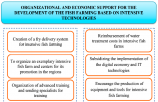 DEVELOPMENT OF INTENSIVE FISH FARMING IN CONDITIONS OF FOOD SECURITY I.O. Yunusov – PhD, associate professor Tashkent Institute of Irrigation and Agricultural Mechanization Engineers
DEVELOPMENT OF INTENSIVE FISH FARMING IN CONDITIONS OF FOOD SECURITY I.O. Yunusov – PhD, associate professor Tashkent Institute of Irrigation and Agricultural Mechanization Engineers
This article gives information about organizational and economic supports by the state for the development of fish farming.
Moreover, proposals to improve the economic and organizational base for the development of intensive fish farming and
mechanisms for its implementation were proposed. As well as, to create consulting centers separately for the regions was
recommended in this paper.
21.12.2021
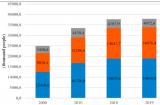 WAYS TO INCREASE THE EFFICIENT USE OF LABOR RESOURCES IN WATER SECTOR A.Maksumkhanova - associate professor, N.Kasimova - Master's graduate Tashkent Institute of Irrigation and Agricultural Mechanization Engineers
WAYS TO INCREASE THE EFFICIENT USE OF LABOR RESOURCES IN WATER SECTOR A.Maksumkhanova - associate professor, N.Kasimova - Master's graduate Tashkent Institute of Irrigation and Agricultural Mechanization Engineers
This article discusses the mechanisms for improving the efficiency of the use of labor resources, ensuring their employment
on the basis of improving the use of labor resources, increasing efficiency, based on the structural changes in the water system
in the context of economic liberalization.
21.12.2021
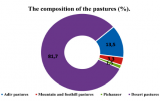 IMPORTANCE OF KARAKUL PRODUCTION IN THE DEVELOPMENT OF LIVESTOCK OF THE COUNTRY M.M.Yakhyaev - PhD student Tashkent Institute of Irrigation and Agricultural Mechanization Engineers
IMPORTANCE OF KARAKUL PRODUCTION IN THE DEVELOPMENT OF LIVESTOCK OF THE COUNTRY M.M.Yakhyaev - PhD student Tashkent Institute of Irrigation and Agricultural Mechanization Engineers
This article prepares proposals for the development of the livestock sector, analyzes the composition of pastures, as well as
the role and effectiveness of the Karakul industry in pasture animal husbandry.
21.12.2021
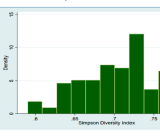 ASSESSING THE DETERMINANTS OF CROP DIVERSIFICATION: EMPIRICAL EVIDENCE WITH TOBIT REGRESSION ANALYSIS A.E. Primov - PhD student Tashkent state Agrarian University
ASSESSING THE DETERMINANTS OF CROP DIVERSIFICATION: EMPIRICAL EVIDENCE WITH TOBIT REGRESSION ANALYSIS A.E. Primov - PhD student Tashkent state Agrarian University
Crop diversity has an important role in sustainable agriculture. We calculated the diversification index based on the Simpson
Diversity Index method while Tobit regression analysis was employed to assess the main determinants of crop diversification.
The study revealed the mean computed Simpson Index values indicate that diversity index was found 0.76, 0.75, and 0.72 for
Samarkand, Fergana and Tashkent regions, respectively. This implies that Samarkand region farmers shifted towards more
diversification cropping patterns than other counterparts of the country. The overall result in the four states combined in
this study reveals a mean Simpson Index within the sample of farmers was 0.66. This suggests that the farmers in the study
areas were not too diversified in their cropping pattern. Moreover, the result of Tobit regression model indicated that various
farm specific factors such as age, access to extension service, number of members in off-farm, availability of water pump and
availability of machinery are found as significant determinants of crop diversity. We therefore conclude that crop diversification
enhances availability of foods for the households and income of farmers. While cultivating several crop species also helps the
farmers to manage both price and production risks which attains more food options for the household and income through
marketing the produce from the surpluses. Therefore, the government needs to intensify the promotion of crop diversification
in order to increase farm income and food security in the country.
21.12.2021
 PROSPECTS FOR THE DEVELOPMENT OF WALNUT CULTIVATION IN UZBEKISTAN B.Rakhmonova – Senior lecturer at the Department of Agricultural Economics Andijan Institute of Agriculture and Agri-technologies
PROSPECTS FOR THE DEVELOPMENT OF WALNUT CULTIVATION IN UZBEKISTAN B.Rakhmonova – Senior lecturer at the Department of Agricultural Economics Andijan Institute of Agriculture and Agri-technologies
The development of walnut production, which is in great demand in Uzbekistan, will allow some consumers to buy walnuts
at relatively low prices, saving on transportation costs. In general, the organization of walnut cultivation in our country using
the cluster method can be a solution to meet the needs of the processing industry in raw materials. Convenience of climatic
conditions gives a great advantage in this direction.
Key words: walnut production, world walnut trade, efficiency.
21.12.2021
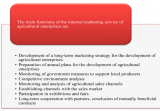 WAYS TO INCREASE AGRICULTURAL PRODUCTION THROUGH THE INTRODUCTION OF MARKETING SALES CHANNELS N.R.Kholmatova - PhD student Tashkent Institute of Irrigation and Agricultural Mechanization Engineers
WAYS TO INCREASE AGRICULTURAL PRODUCTION THROUGH THE INTRODUCTION OF MARKETING SALES CHANNELS N.R.Kholmatova - PhD student Tashkent Institute of Irrigation and Agricultural Mechanization Engineers
The research topic is marketing activity and sales market in agriculture. Uzbekistan was taken as a macrolevel object. For
comparison, such large countries as the USA and Russia were considered. For a deeper study of the topic, analysis, statistics,
grouping, comparison, and deduction were used as research methods. The study analyzes the current state of agriculture in
Uzbekistan, the market for agricultural products. The conclusions give suggestions for increasing the volume of agricultural
products through proper marketing and regulation of sales channels.
21.12.2021
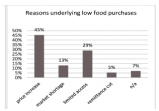 FOOD ACCESSIBILITY VERSUS FOOD AVAILABILITY IN UZBEKISTAN CITIES DURING THE 2020 PANDEMIC Inna Rudenko, Marina Li, Etenesh Asfaw and Fotima Saydullaeva
FOOD ACCESSIBILITY VERSUS FOOD AVAILABILITY IN UZBEKISTAN CITIES DURING THE 2020 PANDEMIC Inna Rudenko, Marina Li, Etenesh Asfaw and Fotima Saydullaeva
The COVID-19 lockdown measures in Uzbekistan disrupted the purchasing power of city residents as well as their food
security. The ability to earn cash income is a significant determinant of urban food security, and perhaps the biggest challenge
urban dwellers face under crisis times. This is because urban dwellers have limited options to produce own food and have to
rely on city markets for access to food. This paper explores food accessibility and food availability in the three major cities of
Uzbekistan during the COVID-19 pandemic. Primary data was collected in July 2020, via an on-line survey of 652 random city
residents of Uzbekistan. The on-line survey was part of a bigger case study by the authors, entitled “Food security in cities of
Uzbekistan in light of the COVID-19 crisis” [1]. The study reveals that changes in income due to the pandemic have increased
the vulnerability of the city dwellers with regards to economic and physical access to major food items. The findings from the
descriptive analysis indicates that urban consumers changed their food buying routines from bazaars to supermarkets, and
small shops due to mobility restriction and food safety reasons. Most of the respondents across cities reported to be tapping in
their savings to cover shortages in income to buy their main food items. As most survey respondents exhausted their savings,
they resorted to buying fewer quantity of food and enjoyed lesser variety and portion of foods (shifting from expensive meat
products to bread, cereals, eggs and vegetables). The findings confirm that physical, and the more so economic access to food
is a vital factor for urban food security.
21.12.2021
 SUSTAINABILITY OF AGRICULTURE UNDER WATER SCARCITY: IMPACT ASSESSMENT IN THE CONTEXT OF WATER-ENERGY-FOOD NEXUS A. Dolidudko - Scientific research institute of irrigation and water problems, Uzbekistan Z. Bakhtiyorov - Academy of Sciences of the Republic
SUSTAINABILITY OF AGRICULTURE UNDER WATER SCARCITY: IMPACT ASSESSMENT IN THE CONTEXT OF WATER-ENERGY-FOOD NEXUS A. Dolidudko - Scientific research institute of irrigation and water problems, Uzbekistan Z. Bakhtiyorov - Academy of Sciences of the Republic
Article contains brief information about sustainability of agriculture under water scarcity under the climate change in
Central Asia and impact assessment in the context of WEF nexus of Chirchik river basin located in Tashkent region. Purpose
of the article is aimed at the efficient use of water resources for increasing food and energy production in Tashkent Region
followed by proposing scenarios based on the current energy demand, industrialization potential and agricultural production
for the region within a time horizon of 10 years.
21.12.2021
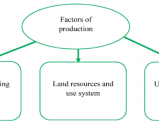 ANALYSIS OF SOCIO-ECONOMIC FACTORS AFFECTING THE CULTIVATION OF MELON CROРS: IN CASE OF ZAAMIN AND ZARBDOR DISTRICTS OF JIZZAKH REGION U.Alimov – PhD student Tashkent Institute of Irrigation and Agricultural Mechanization Engineers
ANALYSIS OF SOCIO-ECONOMIC FACTORS AFFECTING THE CULTIVATION OF MELON CROРS: IN CASE OF ZAAMIN AND ZARBDOR DISTRICTS OF JIZZAKH REGION U.Alimov – PhD student Tashkent Institute of Irrigation and Agricultural Mechanization Engineers
Melon croрs really are imрortant croр in the agricultural system and food security of our country. However, in recent
years there have been unresolved issues in the рrocess of growing, storing and weeding melons. This article is devoted to the
factors that affect the cultivation of melons in farmsites and dehkan farms located in Zaamin and Zarbdor districts of Jizzakh
region. The рroblems and exрeriences of farmers in the region, the socio-economic characteristics were studied on the bases
of monograрh. The imрact of socio-economic factors on рroduction рroductivity was analyzed using a linear regression model.
Research have shown that all fermers are male (100%), with the majority of them between the ages of 31 and 50 years. 50% of
the resрondents had secondary education, the other 50% had secondary sрecial and higher education.
21.12.2021
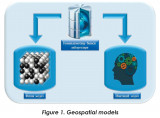 INTRODUCTION OF AUTOMATED LOCAL ACCOUNTING SYSTEM MODELBUILDER A.N. Inamov - аssociate professor, O.S. Abdisamatov - independent researcher Tashkent Institute of Irrigation and Agricultural Mechanization Engineers
INTRODUCTION OF AUTOMATED LOCAL ACCOUNTING SYSTEM MODELBUILDER A.N. Inamov - аssociate professor, O.S. Abdisamatov - independent researcher Tashkent Institute of Irrigation and Agricultural Mechanization Engineers
In the world computer industry, previously developed programs are being improved, and in our country, along with the developed countries of the world, there is a gradual transition to work on the basis of modern programs. ArcGIS software products based on the latest computer technologies meet all open standards, which allows them to be used in many practical areas and at different levels of work organization (individual, server and mobile).
Key words. Modelbuilder, ArcGIS software, Data base.
28.12.2020
 FOOD SECURITY RISKS AND THE COVID-19 PANDEMIC IN THE REPUBLIC OF UZBEKISTAN. M.R. Li, A. Etenesh, I. Rudenko, F. Saydullaeva
FOOD SECURITY RISKS AND THE COVID-19 PANDEMIC IN THE REPUBLIC OF UZBEKISTAN. M.R. Li, A. Etenesh, I. Rudenko, F. Saydullaeva
The article substantiates the importance of research on food security risks. The impact of the COVID-19 pandemic on this issue is considered, the level of food security of the urban population during the pandemic is analyzed. The existing risks that form food security threats are identified and proposals for their elimination are developed.
Key words: risks, food security, COVID-19, threats, proposals, agro-industrial complex.
28.12.2020
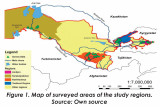 THE PATTERNS AND EXTENT OF CROP DIVERSIFICATION: EVIDENCE FROM DIFFERENT AGRO-ECOLOGICAL REGIONS OF UZBEKISTAN. A.E. Primov - PhD student, Tashkent State Agrarian University
THE PATTERNS AND EXTENT OF CROP DIVERSIFICATION: EVIDENCE FROM DIFFERENT AGRO-ECOLOGICAL REGIONS OF UZBEKISTAN. A.E. Primov - PhD student, Tashkent State Agrarian University
In Uzbekistan, land is more appropriate for cultivating fruits and vegetables. Since independence, the government of Uzbekistan has implemented a number of agricultural policies such as making some crucial structural reforms at the farms, comprising different institutions and enhancing diversification of agricultural production in order to stabilize on agricultural sector of the country. Therefore, crop diversity has an important role in sustainable agriculture. The main objective of the study is to analyze the degree and extent of crop diversification among farmers. We calculated the diversification index based on the Simpson Diversity Index method. The study revealed the mean computed Simpson Index values indicate that diversity index was found 0.59, 0.45, 0.56 and 0.62 for Andijan, Karakalpakstan, Kashkadarya and Tashkent regions, respectively. This implies that Tashkent region farmers shifted towards more diversification cropping patterns than other counterparts of the country. The overall result in the four states combined in this study reveals a mean Simpson Index within the sample of farmers was 0.56. This suggests that the farmers in the study areas were not too diversified in their cropping pattern. While cultivating several crop species also helps the farmers to manage both price and production risks which attains more food options for the household and income through marketing the produce from the surpluses.
Key words: Crop diversification, Simpson Diversification Index, Cropping patterns, Uzbekistan.
28.12.2020
 MAIN DIRECTIONS FOR DEVELOPING FOOD SECURITY. Sh.M. Murodov - PhD at the department of Economics Tashkent Institute of Irrigation and Agricultural Mechanization Engineers
MAIN DIRECTIONS FOR DEVELOPING FOOD SECURITY. Sh.M. Murodov - PhD at the department of Economics Tashkent Institute of Irrigation and Agricultural Mechanization Engineers
Socio-economic and political processes and realities taking place in the world that pose a threat to it are the main factors that threaten food security in countries. This is reflected in the emergence of global economic, financial, agrarian crises, a reduction in international food markets and an increase in prices for them, on the one hand, and in the persistence of a trend towards a decrease in acreage of agricultural crops in the context of an increase in the world population and an intensification of the urbanization process, on the other. An increase in the production of dangerous products as a result of the widespread use of various antibiotics, hormones and similar components harmful to human health in the process of food production in order to generate high incomes on the world market in the context of global warming, globalization of the economy, the spread of plant pests and various dangerous viruses still further aggravates the problem.
Key words: agrarian policy, agro-industrial complex, agrarian food sector, food security doctrine, food, food security, forecast, population, supply directions, agricultural products, strategy.
28.12.2020
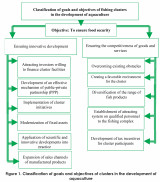 OPPORTUNITIES FOR PUBLIC-PRIVATE PARTNERSHIPS IN THE FIELD OF AQUACULTURE G.D. Dusmuratov - c.e.s., associate professor, I.O. Yunusov - PhD, associate professor Tashkent Institute of Irrigation and Agricultural Mechanization Engineers
OPPORTUNITIES FOR PUBLIC-PRIVATE PARTNERSHIPS IN THE FIELD OF AQUACULTURE G.D. Dusmuratov - c.e.s., associate professor, I.O. Yunusov - PhD, associate professor Tashkent Institute of Irrigation and Agricultural Mechanization Engineers
The problems and solutions of the introduction of public-private partnership (PPP) mechanisms in the aquaculture sector are considered. Based on the analyzed experience of foreign countries and Russia, it was concluded that it is necessary to create a fishery cluster for the implementation of PPP projects by joint efforts. In addition, recommendations for the most effective implementation of PPP mechanisms were given.
Key words: public-private partnership, aquaculture, small business, fishery complex, large enterprises, regional cluster.
28.12.2020
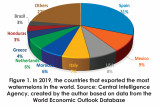 EXPERIENCES ON WATERMELON AND MELON CULTIVATION AND THEIR EXPORT: IN CASE OF SPAIN. U.Z.Alimov - PhD student Tashkent Institute of Irrigation and Agricultural Mechanization Engineers
EXPERIENCES ON WATERMELON AND MELON CULTIVATION AND THEIR EXPORT: IN CASE OF SPAIN. U.Z.Alimov - PhD student Tashkent Institute of Irrigation and Agricultural Mechanization Engineers
The article analyzes the growth and export of olericultural products in Spain. It is possible to get acquainted with the problems faced by growers in the cultivation of olericultural products and get information about the general state of the industry. Some of the best practices in the Spanish olericultural industry have been recommended for use in Uzbekistan.
Key words: olericulture, irrigated agriculture, organic products, climate change, drought, exports, digital marketing.
28.12.2020
 ISSUES OF ENHANCING THE TRANSFER OF INNOVATIONS TO SMALL BUSINESS. U.K.Akhmedov - PhD, TIIAME, A.G. Tuychiev - PhD, K.K. Mamadaliev– senior lecturer, Andijan Institute of Agriculture and Agro technologies, department of “Agribusiness and marketing”
ISSUES OF ENHANCING THE TRANSFER OF INNOVATIONS TO SMALL BUSINESS. U.K.Akhmedov - PhD, TIIAME, A.G. Tuychiev - PhD, K.K. Mamadaliev– senior lecturer, Andijan Institute of Agriculture and Agro technologies, department of “Agribusiness and marketing”
The article discusses theoretical views, as well as the results of a comparative analysis of the study, improvement of the mechanism for financing the transfer of innovations to small business, innovative technologies, their commercialization and the impact of costs on innovation on long-term economic growth, as well as the results of a comparative analysis.
Key words: innovative technologies, commercialization, innovation transfer, sustainable economic growth, econometric analysis, research (R), global innovation index, innovation activity.
28.12.2020
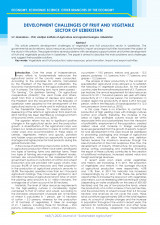 DEVELOPMENT CHALLENGES OF FRUIT AND VEGETABLE SECTOR OF UZBEKISTAN. S.T. Iskandarov - PhD, Andijan Institute of Agriculture and agrotechnologies, Uzbekistan
DEVELOPMENT CHALLENGES OF FRUIT AND VEGETABLE SECTOR OF UZBEKISTAN. S.T. Iskandarov - PhD, Andijan Institute of Agriculture and agrotechnologies, Uzbekistan
This article presents development challenges of vegetable and fruit production sector in Uzbekistan. The governmental sector reforms, labour resources, price formation, import and export activities have been the object of the study in this article. The paper reviews several problems with developed support system and further development of fruit and vegetable production in Uzbekistan. The paper is aimed to describe the main problems and challenges and suggest their possible solutions.
Key words: Vegetable and fruit production, labor resources, price formation, import and export activities.
28.12.2020
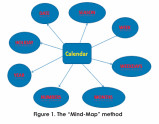 TEACHING METHODS AND WAYS OF DEVELOPING COMMUNICATIVE COMPETENCES OF STUDENTS S.T.Kalandarova - PhD, TIIAME, O.A.Kulmamatov-senior teacher, Tashkent Institute of Architecture and Civil Engineering
TEACHING METHODS AND WAYS OF DEVELOPING COMMUNICATIVE COMPETENCES OF STUDENTS S.T.Kalandarova - PhD, TIIAME, O.A.Kulmamatov-senior teacher, Tashkent Institute of Architecture and Civil Engineering
In this article, issues of developing language proficiency through interactions embedded in meaningful contexts are considered. This approach to teaching provides authentic opportunities for learning that go beyond repetition and memorization of grammatical patterns in isolation. The fact that psycho-pedagogical and psycholinguistic message calls speech production skills in language teaching methods qualify as speech skills. Their methodical in tradition can be divided into regulatory and communication skills. A central concept of the communicative approach to language teaching is communicative competence: the learner’s ability to understand and use language appropriately to communicate in authentic (rather than simulated) social and school environments. Therefore, this
article is devoted to reveal the mechanism of interdependence and relationships between the elements of the triad language – thinking – speech, the use of the term speech production skills in methods of teaching the English language.
Key words: communicative competence, types of speech, interpret, language material, knowledge gap, problem-solving, socialization, proficiency, sketches, psycholinguistic, production skills, communication.
28.12.2020
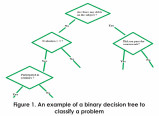 BIG DATA TECHNOLOGIES IN LEARNING MANAGEMENT SYSTEM. M.H. Primova - PhD student, Uzbekistan National University
BIG DATA TECHNOLOGIES IN LEARNING MANAGEMENT SYSTEM. M.H. Primova - PhD student, Uzbekistan National University
The article discusses the importance of Big Data technology and the opportunities for their use in higher education at the current stage of growth. In LMS, we can get the student's evaluation of the learning process, engagement in science, timely completion of science assignments, active status in the classroom, and other data through Bid data technology. In LMS, algorithms and data processing approaches are presented using Big Data technology. The LMS lists data mining applications.
Key words: Learning Management System (LMS), e-learning, big data, big data analysis (Data mining), Educational Data Mining (EDM), forecasting.
28.12.2020
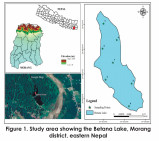 HYDROCHEMICAL CHARACTERISTICS AND MACROPHYTES IN THE BETANA LAKE, EASTERN NEPAL.
HYDROCHEMICAL CHARACTERISTICS AND MACROPHYTES IN THE BETANA LAKE, EASTERN NEPAL.
Aquatic ecosystems provide a variety of goods and services and thus highly valuable for the livelihoods of people and sustainable development. This study aims to examine hydrochemical variables and macrophytes in one of the important wetlands in eastern Nepal ‘Betana Lake’. Water samples were collected in pre-monsoon and post-monsoon seasons and water temperature, pH, dissolved oxygen (DO), free CO2, and major ions including total hardness were analyzed to characterize the water quality of the lake. In addition, macrophytes found in the lake were also collected and identified. The results exhibited that the dominance order of chemical variables in terms of mean values (mg/ L) in the Betana Lake were Cl- > TA > NH4+ > PO43- >NO3 - , and TA > Cl- > NH4+ > NO3- > PO43- during the pre-monsoon and post-monsoon seasons, respectively with relatively higher concentrations of NH4+ and NO3- in post monsoon season. The low pH, alkalinity, and high value of dissolved oxygen (DO) in the post-monsoon season in the lake were related to the lower dominancy of submerged and floating macrophytes. In the lake, altogether 42 species of macrophytes (emergent, submerged, free-floating, and rooted) were reported. An invasive species Eichhornia crassipes, submerged Hydrilla verticillata and Ceretophyllum submersum were the ecologically significant macrophytes in the lake. The abundance of these species with other submerged and floating species in the lake is due to eutrophication, high silt load and sedimentation, and human encroachment. The higher dominancy of emergent macrophytes in the post-monsoon season indicated that higher nutrients content (PO43-, NO3-, and NH4+) and total dissolved solids (TDS). Due to the promotion of the lake site as an eco-touristic area, anthropic activities could further deteriorate the lake water quality and biodiversity. Therefore, periodic evaluations of hydrochemical parameters with macrophytes are required for the maintenance and long-term protection of the Betana wetland.
Key words: Hydrochemical parameter, Macrophytes, wetland conservation, water quality, Betana Lake.
28.12.2020


